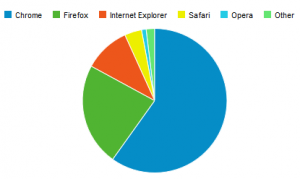![]() You may be asking yourself a question “Do all web browsers perform the same?” Some may say yes but others may not have any idea. Everyone knows that all web browsers can be easy to download and no cost guarantee. At certain times in our lives, we are use to handling one browser and ignoring the rest like we do in social networks. For example, most people used Facebook to chat, communicate our thoughts by passing on information, post blogs, post videos, catch up with old friends, etc. While a majority of us used LinkedIn to network with small businesses or big businesses to get our point across. A few of us don’t understand the advantages and disadvantages between all web browsers. Today, I will describe the differences between the browsers, why there so useful, and how one browser may outperform the others.
You may be asking yourself a question “Do all web browsers perform the same?” Some may say yes but others may not have any idea. Everyone knows that all web browsers can be easy to download and no cost guarantee. At certain times in our lives, we are use to handling one browser and ignoring the rest like we do in social networks. For example, most people used Facebook to chat, communicate our thoughts by passing on information, post blogs, post videos, catch up with old friends, etc. While a majority of us used LinkedIn to network with small businesses or big businesses to get our point across. A few of us don’t understand the advantages and disadvantages between all web browsers. Today, I will describe the differences between the browsers, why there so useful, and how one browser may outperform the others.
What is Internet Explorer?
Internet Explorer is generally the first component of Windows used in 1995 that is generally known as Microsoft Internet Explorer (IE or MSIE) containing a series of graphical web browsers and works only on Windows Operating systems. Over the years, it has been updated to different versions to improve the operating system for Microsoft Windows.
![]() The Internet Explorer supports Java, RSS, CSS, JavaScript, ActiveX for downloading purposes such as videos, songs, or software. It also includes privacy protection such as malware and phishing that is built-in. It mainly use over roughly 90% percent of the world in the market.
The Internet Explorer supports Java, RSS, CSS, JavaScript, ActiveX for downloading purposes such as videos, songs, or software. It also includes privacy protection such as malware and phishing that is built-in. It mainly use over roughly 90% percent of the world in the market.
Most people started out using Internet Explorer the majority of the time when it comes to browsing the internet, checking emails, listening to music online, shopping online, and etc. This was the first web browser consumers used in technology world before other web browsers came out. For more information check out Internet Explorer.
 In 2012, 26% of the users on internet are using Internet Explorer but Google Chrome came in close to second place in the competition of usage share in April 2012 followed by Firefox and so on.
In 2012, 26% of the users on internet are using Internet Explorer but Google Chrome came in close to second place in the competition of usage share in April 2012 followed by Firefox and so on.
Looking at the latest updates, compared to 2012, the majority of users on the internet use Chrome while Firefox is in second in the competition of usage share followed by Internet Explorer.
Pros:
- Free to download at no cost
- Offers every help option we looked for, including direct support via email and telephone
- Provides speed and functionality
- Easy to use
- Mostly used throughout the world
Cons:
- Bugs come in IE (Internet Explorer) users at different times and fixing them is time consuming
- Microsoft is unaware of finding any bugs hidden within the browser to fix
- Installation on software such as Adobe Flash Player can be slow and has to be done manually sometimes when it comes to updates that need to be install
- Lack of security in ActiveX controls
- Lack of built in features to synchronize bookmarks
- Confusion between 32 and 64 bit versions for IE
- Lack of cross-platform experience (ie. used in Windows but not Mac)
- Huge target for hackers and cyber-thieves
What is Safari?
Safari is web browser that was produced and developed by Apple Inc. which functions on a Mac OX, iOS, and Windows operating system. It was first put out in public on January 7, 2003 by Apple Inc. It was Apple’s default browser known as “Panther” for Mac users and released on June 11, 2007 on Microsoft Windows operating system.
 Safari is generally for Mac users who are operating Mac OS X 8.1 and onwards for later systems. Many people didn’t have a MacBook when they first started using computers because it was either too expensive or were so used to using a Windows platform even though IE (Internet Explorer) was also good for Mac at the time. For more information check out Safari.
Safari is generally for Mac users who are operating Mac OS X 8.1 and onwards for later systems. Many people didn’t have a MacBook when they first started using computers because it was either too expensive or were so used to using a Windows platform even though IE (Internet Explorer) was also good for Mac at the time. For more information check out Safari.
Pros:
- Ease of Use
- Page-load times impressive
- Provides all of security features
- Cleans up unnecessary junk
- Great for Mac users and free to download
- Speed compatibility
- Extremely Fast to download for Mac users
- Add extensions from Safari Extensions
Cons:
- Lack of customization options many competitors offer
- Support system may be missing some options for users in FAQ section
- Trouble with Google built-in search engine that can’t be change
- Difficulty deleting cookies on exit automatically
What is Google Chrome?
Google Chrome is a freeware browser developed by Google using the WebKit layout engine. It was first release on Microsoft Windows operating system on September 2, 2008 in 43 different languages in beta version. It was written in C++, Assembly, Python, and JavaScript. Currently, it is available in 52 languages. For more information you can check out Google Chrome.
It was written in C++, Assembly, Python, and JavaScript. Currently, it is available in 52 languages. For more information you can check out Google Chrome.
Pros:
- Fast browsing performance
- More control over your tabs
- More dynamic home page for common used search engines and bookmarks
- More speed and won’t slow down on your browsing through internet
- Built-in Flash and PDF Support
- Has sync capabilities that allow you to access your customized browser from any computer
- Makes searching so much simpler
- Ease of use
- Great security
- Free to download at no cost
Cons:
- Lack of parental controls
- Minor site incompatibilities
- Graphics hardware acceleration doesn’t work with all graphics cards
What is Firefox?
Firefox is a free and open source web browser developed for Microsoft Windows, Mac OS X, and Linux coordinated by Mozilla Corporation and Mozilla Foundation. It was first version 1.0 released on November 9, 2004. It is now available in about 78 languages worldwide. The original title was Phoenix from the Phoenix Technologies and had to be renamed because of trademark problems. It was renamed to Firebird which was a free database software project. There was conflict in using the name and the matter was resolved when they renamed the browser again to Firefox. Later on February 9, 2004, Mozilla Firebird became known as Mozilla Firefox then simply referred to as Firefox (Fx, fx, or FF).
 Firefox was introduced to new comers who were used to browsing through Internet Explorer in the early 90s. Majority of people may stick to this brand since it most popular browsers amongst its competitors based on its features and may allow secure downloads on applications and programs. For more information check out Firefox.
Firefox was introduced to new comers who were used to browsing through Internet Explorer in the early 90s. Majority of people may stick to this brand since it most popular browsers amongst its competitors based on its features and may allow secure downloads on applications and programs. For more information check out Firefox.
Pros:
- More secure privacy mode and downloading
- More intuitive navigation
- Contains minimalist interface
- Offers lot of help and support on Firefox tutorial
- Ease of use
- More Customization
- Speed and more compatible
- Easy to have add-ons
- Free to download at no cost
Cons:
- No thumbnail previews or mouse gestures however there are free plug-ins from Firefox Mozilla that address both these issues
- Resource heavy “uses a heavy portion of memory to run”
Conclusion:
I’m pretty sure most of you may already feel comfortable of the differences between web browsers. The next time you are on the Internet you may get a better idea of why the certain browsers work better than the other web browsers. Its always good to take time to learn more about how you or your business use certain web browsers.
Overall, everyone has their own preference on which browser they prefer to use. To find out more about the browsers you can check out TopTenReviews or Browser Information online.
Sources:
1. en.wikipedia.org/wiki/Internet_Explorer
2. www.webopedia.com/TERM/I/Internet_Explorer.html
3. http://blogs.computerworld.com/18552/12_reasons_not_to_use_internet_explorer_ever
4. en.wikipedia.org/wiki/Safari_(web_browser)
5. en.wikipedia.org/wiki/Google_Chrome
6. http://www.pcmag.com/article2/0,2817,2373853,00.asp
7. http://internet-browser-review.toptenreviews.com/google-chrome-review.html
8. en.wikipedia.org/wiki/Firefox
9. http://internet-browser-review.toptenreviews.com/mozilla-firefox-review.html
10. http://internet-browser-review.toptenreviews.com/
11. http://internet-browser-review.toptenreviews.com/internet-explorer-review.html
12. http://www.w3schools.com/browsers/default.asp
13. http://deflexion.com/2007/07/safari-3-pros-and-cons




The choice depends on your choice:
If you want speed & performance as your metric then Chrome & Opera. Chrome with the enhanced extension capabilities.
If you want the best User Interface, Microsoft Edge could be your preference
Mozilla allows customization. So, if you want to twist & turn, firefox could be the choice
Shen Ge liked this on Facebook.
Albert Luther Jackson liked this on Facebook.
This article is very interesting especially if people want to get to know more about technology of how each major browser is different.
Joseph Hanna liked this on Facebook.
I think Google Chrome having built-in flash and PDF support will finally fix those annoying browser crashes due to adobe plugins. Although I’ve been using Firefox for a while, the frequent updates making it less usable every time and the plugin crashes hanging the browser is starting to make me consider Google Chrome.
RT @centennialarts: Comparison on all Major Web Browsers: Internet Explorer, Safari, Firefox, and Google Chrome: … http://t.co/Id5U3G2Y